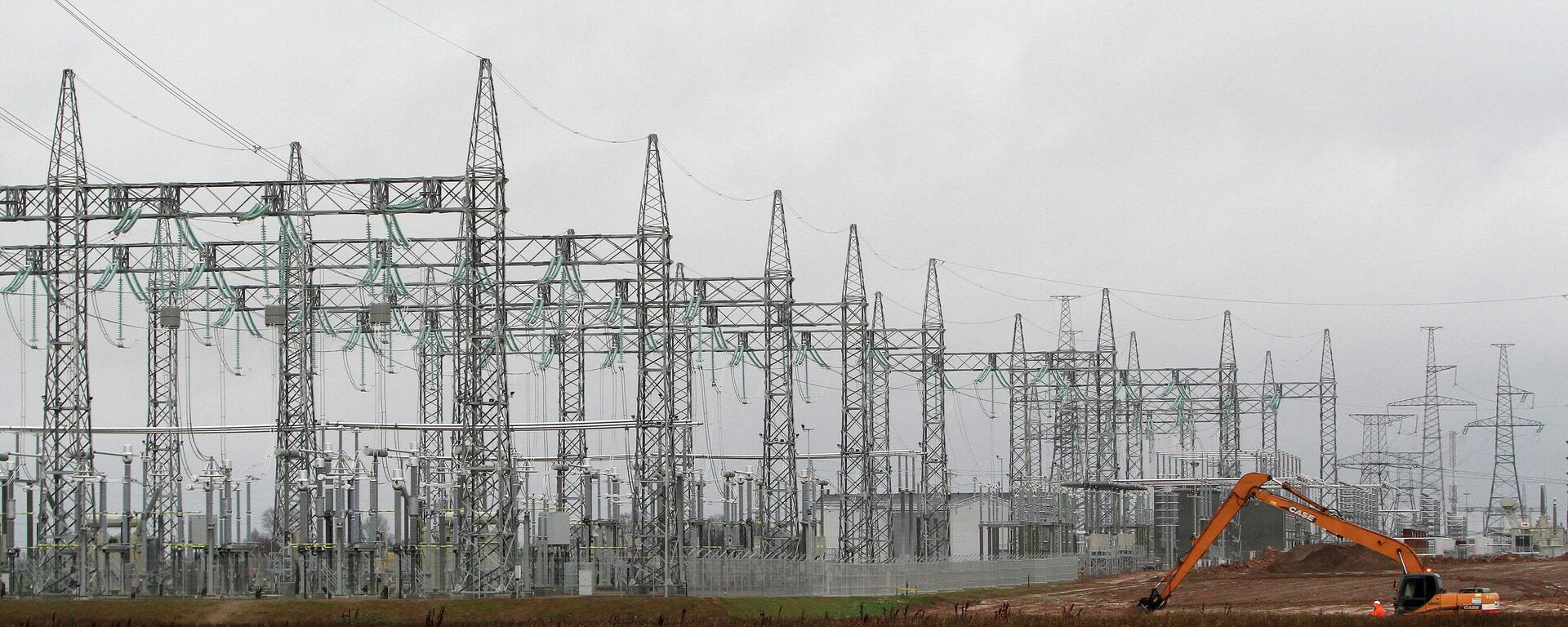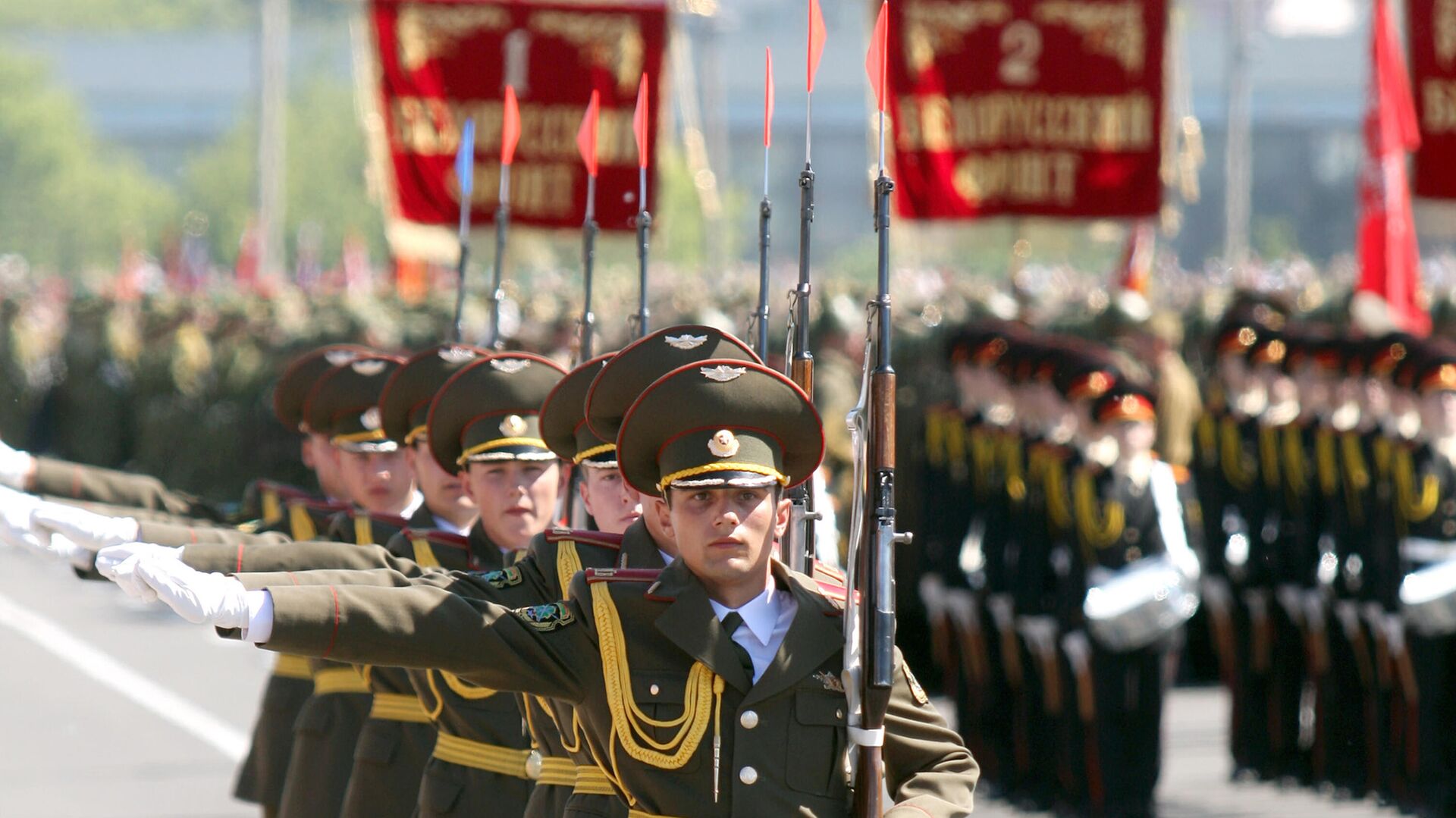https://sputnikglobe.com/20211218/belarusian-official-warns-baltic-states-would-be-completely-wiped-out-in-event-of-european-war-1091629076.html
Belarusian Official Warns Baltic States Would Be Completely Wiped Out in Event of European War
Belarusian Official Warns Baltic States Would Be Completely Wiped Out in Event of European War
Sputnik International
The Baltic countries stand at the fault line of a potential military conflagration between Russia and the West, according to a senior Belarusian security official
2021-12-18T14:47+0000
2021-12-18T14:47+0000
2021-12-18T14:48+0000
belarus
russia
baltic states
https://cdn1.img.sputnikglobe.com/img/07e5/0c/12/1091629051_0:112:3010:1805_1920x0_80_0_0_40cfdb36ead693d7a6bc75bfdc8de70f.jpg
The nations of Estonia, Latvia and Lithuania would be destroyed completely in the event of a major new military conflict in Europe, Belarusian Security Council deputy chief Maj. Gen. Vladimir Archakov has warned.Accusing the Baltic countries of aggravating regional tensions, Archakov stressed from a military standpoint, the Baltic states’ capabilities are utterly insignificant.The official said that the activities of Poland were far more concerning for Belarus. “For the sake of increasing its political potential, and especially under the pretext of confronting the ‘Russian threat’, Warsaw is actively developing its bilateral military partnership with the United States, on top of both countries’ membership in NATO,” he said.Archakov also pointed to Washington’s use of Polish airspace to conduct optical-electronic reconnaissance of Belarusian territory, and to information indicating that the US had a continent of 4,000 troops near the Polish-Belarusian border, with these numbers expected to grow. Archakov also said that the modernization of the Polish military that’s currently underway is based largely on orders from the US military-industrial complex, with appropriations for the years 2021-2035 expected to amount to a whopping $133 billion.Baltic WorriesRussia has repeatedly expressed concerns over the concentration of NATO military power in the Baltic countries, with Western think tanks regularly issuing reports citing the region as a possible flashpoint for confrontation between Russia and the Western bloc.Officials from Estonia, Lithuania and Latvia have repeatedly called on the West to take a more hardline approach on Russia, demanding new sanctions on Friday over alleged threats ranging from the weaponization of migrants to high prices for natural gas, for example.The three nations have also taken the lead in the geopolitical and economic disputes between Moscow and the West, working to assist the US in its efforts to sabotage the Nord Stream 2 pipeline, and cheerleading European and US restrictions targeting Russia, even at the cost of billions of dollars in revenue to their own fisheries and dairy industries.Last week, Lithuanian Energy Minister Dainius Kreivys proudly announced that the Baltic countries were on track to completely decoupling themselves from Russia’s electricity grid by 2025. Observers predict that such a move will further increase electricity prices for domestic consumers.The Baltics joined NATO in 2004, bringing with them the prospect of US troops as little as 115 km from St. Petersburg, Russia’s second city. In a pair of draft treaty proposals delivered to US diplomats this week explicitly outlining Russia’s security ‘red lines’, Moscow explicitly mentioned the Baltic region as an area where Russia and the West must engage in dialogue and interaction to “prevent incidents on and over the high seas” in the area.Russian officials have repeatedly warned Eastern European states allied to the United States which host offensive NATO military infrastructure that their territory would be targeted in the event of a conflict. In 2019, Russian President Vladimir Putin said that Moscow would be forced to put any European countries agreeing to host US nuclear weapons in its missiles’ crosshairs.
https://sputnikglobe.com/20211208/baltics-to-completely-disconnect-from-russian-power-grid-by-2025-lithuanian-energy-minister-says-1091349856.html
belarus
baltic states
Sputnik International
feedback@sputniknews.com
+74956456601
MIA „Rossiya Segodnya“
2021
News
en_EN
Sputnik International
feedback@sputniknews.com
+74956456601
MIA „Rossiya Segodnya“
Sputnik International
feedback@sputniknews.com
+74956456601
MIA „Rossiya Segodnya“
baltic countries, war danger
baltic countries, war danger
Belarusian Official Warns Baltic States Would Be Completely Wiped Out in Event of European War
14:47 GMT 18.12.2021 (Updated: 14:48 GMT 18.12.2021) Minsk has expressed concerns about escalating tensions between Moscow and the West amid claims by officials in the US and NATO that Russia may be preparing to 'invade Ukraine'. Russia has dismissed these allegations as a false attempt to further deteriorate relations between Moscow and the Western alliance.
The nations of Estonia, Latvia and Lithuania would be destroyed completely in the event of a major new military conflict in Europe, Belarusian Security Council deputy chief Maj. Gen. Vladimir Archakov has warned.
“It’s as if they are dreaming of a serious conflict, not considering that in the event of such a conflagration, the centers of power that collide will simply sweep them off the face of the Earth,” the officer
said, speaking to Russia’s Natsionalnaya Oborona (‘National Defence’) magazine.
Accusing the Baltic countries of aggravating regional tensions, Archakov stressed from a military standpoint, the Baltic states’ capabilities are utterly insignificant.
The official said that the activities of Poland were far more concerning for Belarus. “For the sake of increasing its political potential, and especially under the pretext of confronting the ‘Russian threat’, Warsaw is actively developing its bilateral military partnership with the United States, on top of both countries’ membership in NATO,” he said.
Archakov also
pointed to Washington’s use of Polish airspace to conduct optical-electronic reconnaissance of Belarusian territory, and to information indicating that the US had a continent of 4,000 troops near the Polish-Belarusian border, with these numbers expected to grow. Archakov also said that the modernization of the Polish military that’s currently underway is based largely on orders from the US military-industrial complex, with appropriations for the years 2021-2035 expected to amount to a whopping $133 billion.
“In effect, we are seeing that Polish foreign policy’s eastern vector continues to have a clear anti-Russian and now anti-Belarusian character, now combined with a provocative military overtone,” Archakov warned.
Russia has repeatedly expressed concerns over the concentration of NATO military power in the Baltic countries, with Western think tanks regularly issuing reports citing the region
as a possible flashpoint for confrontation between Russia and the Western bloc.
Officials from Estonia, Lithuania and Latvia have repeatedly called on the West to take a more hardline approach on Russia,
demanding new sanctions on Friday over alleged threats ranging from the weaponization of migrants to high prices for natural gas, for example.
The three nations have also taken the lead in the geopolitical and economic disputes between Moscow and the West, working to assist the US in its efforts to sabotage the Nord Stream 2 pipeline, and cheerleading European and US restrictions targeting Russia, even at the cost of billions of dollars in revenue to their own fisheries and dairy industries.
Last week, Lithuanian Energy Minister Dainius Kreivys proudly announced that the Baltic countries were on track to completely decoupling themselves from Russia’s electricity grid by 2025. Observers predict that such a move will further increase electricity prices for domestic consumers.

8 December 2021, 11:58 GMT
The Baltics joined NATO in 2004, bringing with them the prospect of US troops as little as 115 km from St. Petersburg, Russia’s second city. In a
pair of draft treaty proposals delivered to US diplomats this week explicitly outlining Russia’s security ‘red lines’, Moscow explicitly mentioned the Baltic region as an area where Russia and the West must engage in dialogue and interaction to “prevent incidents on and over the high seas” in the area.
Russian officials have repeatedly warned Eastern European states allied to the United States which host offensive NATO military infrastructure that their territory would be targeted in the event of a conflict. In 2019, Russian President Vladimir Putin
said that Moscow would be forced to put any European countries agreeing to host US nuclear weapons in its missiles’ crosshairs.



